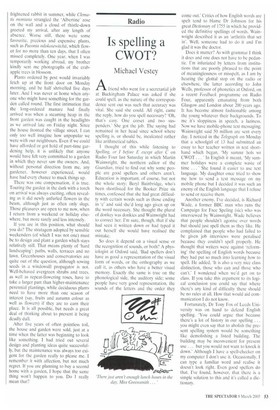Is spelling a CWOT?
Michael Vestey
Afriend who went for a secretarial job at Buckingham Palace was asked if she could spell, as the nature of the correspondence sent out was such that accuracy was vital. She said she could. All right, came the reply, how do you spell necessary? 'Oh, that's easy. One corset and two suspenders. She got the job. The saying had remained in her head since school where spelling is. or should be, inculcated rather like arithmetical tables.
I thought of this while listening to Spelling, or I before E except after C on Radio Four last Saturday in which Martin Wainwright, the northern editor of the Guardian, tried to find out why some people are good spellers and others aren't. Education is important, of course, but not the whole story; Beryl Bainbridge, who's been shortlisted for the Booker Prize six times, confessed that she had great difficulty with certain words such as those ending in 'e' and said she'd long ago given up on the word necessary. She thought the plural of donkey was donkies and Wainwright had to correct her. I'm sure, though, that if she had seen it written down or had typed it out herself she would have realised the mistake.
So does it depend on a visual sense or the recognition of sounds, or both? A physiologist at Oxford said, 'Bad spellers don't have as good a representation of the visual form of words, or the orthography as we call it, as others who have a better visual memory. Exactly the same is true on the phonological side, the auditory side; some people have very good representation, the sounds of the letters and the order they come out.' Critics of how English words are spelt tend to blame Dr Johnson for his great Dictionary of 1755 in which he provided the definitive spellings of words. Wainwright described it as an 'arthritis that set in'. Well, someone had to do it and I'm glad it was the doctor.
Does it matter? As with grammar I think it does and one does not have to be pedantic. I'm infuriated by letters from institutions that are poorly phrased to the point of meaninglessness or misspelt, as I am by hearing the glottal stop on the radio or elsewhere, the latter according to John Wells, professor of phonetics at Oxford, on a recent Feedback programme on Radio Four, apparently emanating from both Glasgow and London about 200 years ago. It has become almost fashionable among the young whatever their backgrounds. To me it's sloppiness in speech, a laziness. Now we have mobile-phone text messaging; Wainwright said 50 million are sent every day. I noticed in the Telegraph on Monday that a schoolgirl of 13 had submitted an essay to her teacher written in text shorthand which began, 'My summr hols wr
CWOT 'In English it meant, 'My summer holidays were a complete waste of time .. . ' She found it easier to use text language. My daughter once tried to show me how to send a text message on my mobile phone but I decided it was such an enemy of the English language that I refuse to send or receive them.
Another enemy, I've decided, is Richard Wade, a former BBC man who runs the Campaign for Free Speling (sic) who was interviewed by Wainwright. Wade believes that people shouldn't agonise over words but should just spell them as they like. He complained that people who had failed to be given job interviews were penalised because they couldn't spell properly. He thought that writers were against 'reforming' the spelling of English words because they had put so much into learning how to spell. He added, 'It is also a very nice class distinction, those who can and those who can't.' I wondered when we'd get on to class. If you take this argument to its logical conclusion you could say that where there's any kind of difficulty there should be no rules at all. How that would aid communication I do not know.
Fortunately, Dr Tony Fox of Leeds University was on hand to defend English spelling. 'You could argue that because there's a lot of history in our spelling ... you might even say that to abolish the present spelling system would be something like demolishing a listed building. The building may be inconvenient for present use . . . but you would not want to knock it down.' Although I have a spell-checker on my computer I don't use it. Occasionally, I can type a familiar word and realise it doesn't look right. Even good spellers do that. I've found, however, that there is a simple solution to this and it's called a dictionary.


































































 Previous page
Previous page